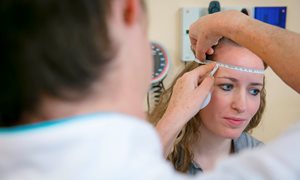
Radboud University Medical Center (Radboudumc) and PacBio today announced a clinical research study to explore genetic causes of rare and genetic diseases. Radboudumc’s Department of Human Genetics, which is one of the largest academic centers for human genetics in Europe, together with PacBio, a leading developer of high-quality, highly accurate sequencing solutions, aims to uncover genetic origins of rare and genetic diseases. The study will also explore the feasibility and cost effectiveness of using PacBio’s HiFi sequencing technology as part of routine clinical use.
Radboudumc scientists are taking on the challenge of solving some of the most puzzling cases of undiagnosed rare diseases using PacBio’s HiFi long-read sequencing technology for whole genome sequencing (WGS). Despite having undergone all standard-of-care methods, including short-read sequencing, these individuals still need answers. By studying the potential consolidation of standard molecular tests into a clinical workflow with PacBio HiFi WGS, the project aims to explore PacBio’s technology as a potential first-line assay, which could pave the way for a more efficient and effective diagnostic process in the future. If successful, we hope to help human geneticists in revolutionizing the current iterative testing workflows that are all too common in practice today.
“We believe the recent advances in throughput and cost brought by the Revio sequencing system will enable Radboudumc to test thousands of samples by long-read WGS all within a single center,” said Alexander Hoischen, Associate Professor Genomic Technologies and Immuno-Genomics, and Lisenka Vissers, Professor Translational Genomics. “This will allow us to study the potential clinical utility and better understand the health economics of bringing highly accurate HiFi sequencing in a clinical setting on a large scale at Radboudumc. With this advancement in technology, we will maintain our position as one of the world’s most innovative diagnostic centers, pushing the boundaries of what is possible in the field of genomics.”
Helger Yntema, PhD, head of diagnostic divisions in Radboudumc continues: “A highly efficient diagnostic laboratory with a generic workflow reflects our ambition to be amongst most innovative diagnostic centers in the world.” Arthur van den Wijngaard, PhD, head of diagnostic division in Maastricht University Medical Center (MUMC+) adds: “Collaboration on these groundbreaking technologies is an important step forward in our academic alliance with Radboudumc.” Christian Gilissen, Professor Genome Bioinformatics: “HiFi genomes are the most comprehensive genomes, with high sensitivity to all variant types we have worked with, and I anticipate that they will allow many new rare disease discoveries.” The comprehensiveness of HiFi genomes was also shown in a pilot study for this collaboration that was just published in the journal of Genome Medicine (https://doi.org/10.1186/s13073-023-01183-6).
Han Brunner, Professor Human Clinical Genetics, head of Human Genetics Departments, Radboudumc and Maastricht UMC+: “Long-read sequencing will change lives. It is so important to identify the cause of undiagnosed rare diseases. In first instance for our patients themselves: a molecular diagnosis takes away uncertainty. Some patients tell me the day of ‘their diagnosis’ was the most important day in their life.”
“We believe this study is designed to make significant discoveries in the field of medical genetics, and we can’t wait to see the results,” said Christian Henry, President and Chief Executive Officer of PacBio. “Currently, the genetic basis of 50 percent of rare diseases remain unsolved due to lack of accuracy and depth of current testing workflows. We have joined forces with Radboudumc to better understand this critical gap by using our powerful Revio sequencing systems to identify key variants at scale with extraordinary accuracy. This research not only has the potential to help revolutionize patient care for thousands of individuals each year, but we believe it will also deepen our understanding of the practical application of long-read sequencing technology in routine clinical use. Our collaboration with Radboudumc perfectly aligns with their world-class research capabilities, and we’re thrilled to work together to make a real difference in providing answers for families.”
Radboudumc is a member of several European Reference Networks for Rare Diseases (ERNs), which jointly oversee more than 100,000s of patients with rare genetic diseases across all European Union member states.
To learn more about the benefits of HiFi sequencing in rare disease, visit: https://www.pacb.com/research-focus/human/rare-disease/.
To learn more about the Radboudumc research teams, visit: https://www.radboudumc.nl/en/research/departments/human-genetic.
-
Want to know more about these subjects? Click on the buttons below for more news.
Related news items

Women more likely to develop mild variant Stargardt's disease
24 May 2024In the mild form of Stargardt's disease, an inherited eye disease, women are more likely to experience vision problems than men. This is shown in doctoral research by Stéphanie Cornelis.
go to page
Radboudumc participates in HiFi Solves, a Global Consortium of Clinical Genomics Research Leaders Aim to Share Best Practices and Increase the Understanding of Genetic Disease
22 November 2023HiFi Solves, a Global Consortium of Clinical Genomics Research Leaders including Radboudumc, is going to start
go to page
New Nijmegen method reveals hidden genetic variations Valuable data mining in the dark corners of the exome now possible worldwide
1 November 2023Many hidden genetic variations can be detected with Chameleolyser, a new method developed in Nijmegen.
go to page

